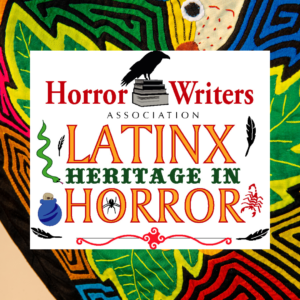Introduction to Latinx Heritage in Horror 2022
Intro to Latinx Heritage in Horror by Rosemary Thorne

Things are looking great for the Latinx Horror community in 2022, and here is some proof of it. Apart from being nominated Bram Stoker Award for “Best Horror Novel for the second time,” Cina Pelayo delivered a great edition of the “2022 Souvenir anthology,” and will be Guest of Honor at StokerCon Pittsburgh 2023. Concurrently, Gabino Iglesias’ last novel has made it to The New York Times, confirming Spanglish is trendy and “barrio noir” a valid subgenre.
Many other Latinx authors are paving the road and accomplishing goals in the States and worldwide. We are especially thankful to Cina and Gabino because they are opening doors as we never imagined; better said, those doors are opened because they imagined the possibility of crossing them and worked hard for it. Their constant commitment to the Horror family allows the rest of us to just worry about giving our best in our submissions, leaving behind our fears of being discriminated by race or country of origin when we aim at displaying horrors in the minds of our readers. Undoubtedly, the Latinx community contributes to raising the quality standards of the horror genre.
Furthermore, we have also seen a rising presence of Latinx authors in catalogs of both Indie and mainstream publishing companies. All kinds of readers look specifically for Latinx Horror in bookstores and libraries. US conventions are hosting stands in which Latinx Horror is widely represented. The participation of Latinx authors in panels and workshops has also multiplied, which means that characters with Latinx origins are populating our imagination and nightmares, and ancient folklore is blending with contemporary narratives and giving alternative meanings to our worlds. These legends are leaving the exclusive lands of religious anthropology studies and being updated as narrations that embrace universal diversity. Slower but steady, translations of native Latinx authors are also becoming an attractive bet for English markets. All of these lead to more recognition in nominations and awards, giving the Latinx community more visibility. The Bram Stoker Awards have always acknowledged the work of its diverse communities. This year’s nominations for these and other awards were a perfect example. Additionally, Brian Keene has recently reminded us that in 2017 the “Splatterpunk Lifetime Achievement Award” was named after the late horror writer Jesús F. González.
There is always room for improvement, but the pace is set: boundaries are blurring, at least in HWA territories. We all are “the other,” meaning that we all are part of an inclusive and diverse community and family. Having multiple and diverse horrors is a sound sign that freedom and tolerance are sound expanding values. We won’t have less than that.
Rosemary Thorne (She/her) is a bilingual writer, translator & Horror researcher living in Madrid, Spain. She was the recipient of the HWA online Scholarship from Hell 2022 and volunteers as HWA Chapter Program Co-Manager.
—
Regarding The 2022 Latinx Heritage In Horror Series
The Horror Writers Association is embarking upon its second annual Latinx Heritage in Horror interview series. This year, some writers expressed that they preferred to be referred to as Latine, as Indigenous People of the Americas, or by their specific heritage origin (such as Mexican, Mexican American, Puerto Rican, etc.) rather than Latinx. We at the HWA Social Media Team strive to respect everyone’s identity and right to self-identify. As a result, question language in some interviews in this year’s series has been edited accordingly. The Latinx Heritage in Horror series will take place between September 15 and October 15, 2022.
– Sumiko Saulson, Social Media Manager for the HWA



